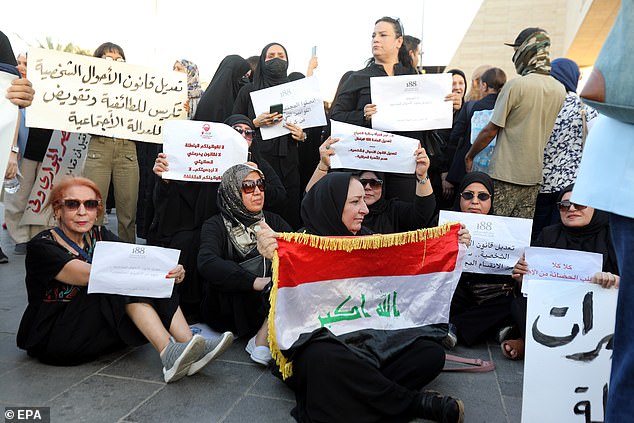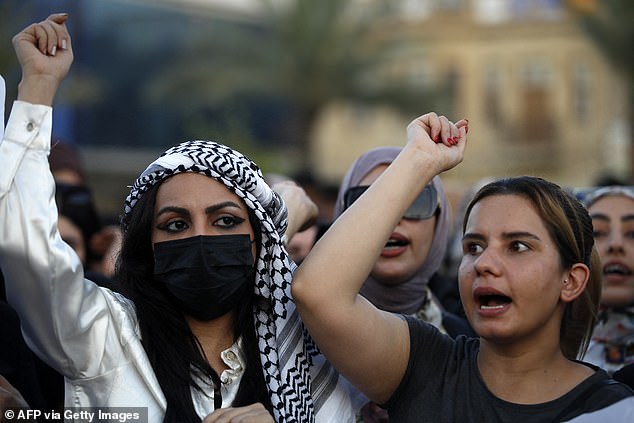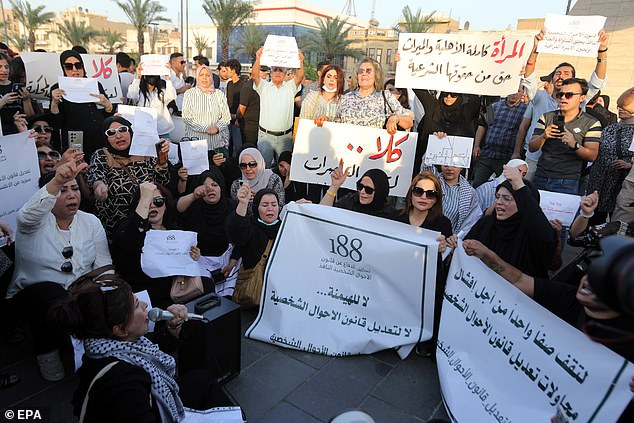- Iraqi law currently sets 18 as the minimum age of marriage in most cases
- But changes would let clerics rule according to their interpretation of Islamic law
Iraq‘s parliament today passed several laws that critics say will effectively legalise child marriage for girls as young as nine.
The amendments to Iraq’s personal status law will give Islamic courts increased authority over family matters, including marriage, divorce and inheritance – a dramatic change to the unified family law and safeguards for women established in 1959.
Iraqi law currently sets 18 as the minimum age of marriage in most cases, but the changes passed Tuesday would let clerics rule according to their interpretation of Islamic law.
Some of these interpretations allow the marriage of girls in their early teens – or as young as nine – under the Ja’afari school of Islamic law followed by many Shiite religious authorities in Iraq.
Proponents of the changes, which were advocated by primarily conservative Shiite lawmakers, defend them as a means to align the law with Islamic principles and reduce Western influence on Iraqi culture.
But Intisar al-Mayali, a human rights activist and a member of the Iraqi Women’s League, said passage of the civil status law amendments ‘will leave disastrous effects on the rights of women and girls through the marriage of girls at an early age’.
‘This violates their right to life as children, and will disrupt the protection mechanisms for divorce, custody and inheritance for women,’ the activist declared.



The parliamentary session which saw the passage of the amendments ended in chaos and accusations of procedural violations.
‘Half of the lawmakers present in the session did not vote, which broke the legal quorum,’ a parliamentary official said on condition of anonymity because he was not authorised to comment publicly.
He said that some members protested loudly and others climbed onto the parliamentary podium.
After the session, a number of legislators complained about the voting process, under which all three controversial laws – each of which was supported by different blocs – were voted on together.
‘Regarding the civil status law, we are strongly supporting it and there were no issues with that,’ said Raid al Maliki, an independent MP.
‘But it was combined with other laws to be voted on together… and this might lead to a legal appeal at the Federal Court.’
Parliament Speaker Mahmoud al-Mashhadani in a statement praised the laws’ passage as ‘an important step in the process of enhancing justice and organising the daily lives of citizens.’
The parliament also passed a general amnesty law that is seen as benefiting Sunni detainees and has been criticised as giving a pass to people involved in corruption and embezzlement.
The chamber passed a land restitution law aimed at addressing Kurdish territorial claims.
The proposed amendments to the law were first announced in August, sparking a wave of demonstrations in Baghdad.
With many Iraqi marriages conducted informally and left unregistered, the revisions will allow figures from Sunni and Shia religious sects to finalise unions between people in law.
The law previously stated that marriage requires ‘a sound mind and completing 18 years of age’, with provisions for women fleeing abuse in annulling a contract.



Fifteen-year-olds could submit a marriage request, which judges could choose to approve if they deem the individual well and obtain their legal guardian’s consent.
A judge could permit the marriage of a 15-year-old ‘if he finds this absolutely necessary’, the law stated, without providing further details.
Under the new laws, marrying Muslim couples would choose either a Sunni or Shia sect, who would be able to represent them in ‘all matters of personal status’ – rather than the civil judiciary.
‘When a dispute occurs between the spouses regarding the doctrine according to whose provisions the marriage contract was concluded, the contract is deemed to have been concluded in accordance with the husband’s doctrine unless evidence exists to the contrary,’ the draft says.
And figures from the offices of each ‘endowment’ would be able to finalise marriages, rather than the courts.
This may also see unregistered marriages – more than a fifth of which involve girls under 14 – legitimised by the state.
The current amendments circulating do not directly refer to the issue of child marriages – but previous drafts have, inspiring sharp and ongoing criticism from rights activists.
Yanar Mohammed, president of the Organisation of Women’s Freedom in Iraq (OWFI), told Middle East Eye the Coordination Framework was using the changes to distract from their own ‘corruption’ and political failures.
She said the proposals served to ‘terrorise Iraqi women and civil society with a legislation that strips away all the rights that Iraqi women gained in modern times’.
Ms Mohammed added that the bill would ‘force archaic Islamic sharia on them that regards women as bodies for pleasure and breeding, and not as human being[s] with human rights.’

